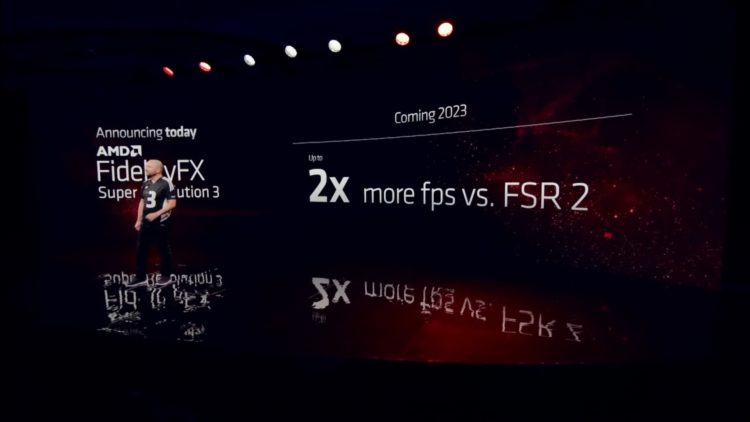Something to look forward to: FidelityFX Super Resolution (FSR) is AMD’s solution for upscaling games to improve performance on a wide range of graphics cards. Team Red didn’t say much about the future of the feature at its RDNA 3 presentation this week, but it confirmed that the next stage of FSR’s evolution is on the way.
During the Radeon 7000 series graphics card reveal, AMD briefly mentioned FSR 3, the successor to its AI-based resolution upscaling technique. Details are scarce, but the update will arrive in 2023.
While the presentation showed plenty of games running with FSR 2, it only teased FSR 3 with an Unreal Engine 5 demo. The third generation of FSR could offer double the 4K frame rates of its predecessor using a feature called Fluid Motion Frames. The name brings to mind Nvidia’s DLSS Frame Generation, an advanced motion interpolation technique the company revealed with DLSS 3 in September.
Exclusive to Nvidia’s new RTX 4000 series graphics cards, Frame Generation uses proprietary Optical Flow Accelerators to create new frames in-between traditionally rendered frames. Tests show that the feature can dramatically increase framerates in certain situations but also increases input latency. Fluid Motion Frames could work similarly, but the company didn’t say whether its new technique needs special hardware.
When discussing FSR during the presentation, AMD repeatedly mentioned the technology’s openness which lets it run on all modern GPUs. In contrast, DLSS only runs on Nvidia’s RTX 2000, 3000, and 4000 cards. Team Red might maintain its current stance by making FSR 3 compatible with non-AMD GPUs.
Something not mentioned in the presentation was machine learning — DLSS’s main advantage over FSR. In June, leaked Github repository patches suggested that AMD might be developing its response to the Tensor Cores that DLSS machine learning depends on, which could feature in the Radeon 7000 and FSR 3.
The repository patches could also have been referring to another new RDNA feature AMD announced this week — AI accelerators. The AI accelerators are supposed to improve performance, but the company didn’t say whether they work through resolution upscaling like Nvidia’s Tensor Cores.
Radeon RX 7900 XTX and 7900 XT cards launch on December 13 for $999 and $899, respectively.
Source by www.techspot.com

























